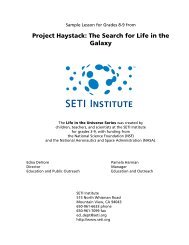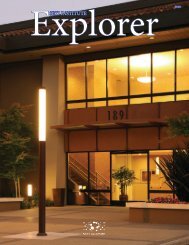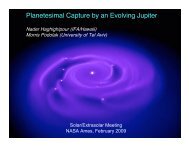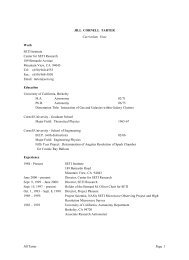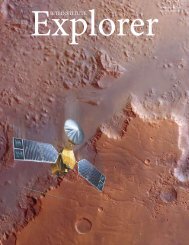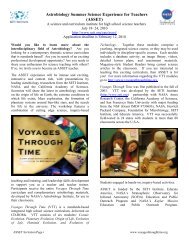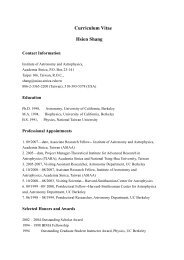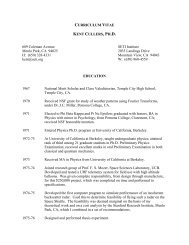Inside the Boardroom with Alan Bagley - SETI Institute
Inside the Boardroom with Alan Bagley - SETI Institute
Inside the Boardroom with Alan Bagley - SETI Institute
You also want an ePaper? Increase the reach of your titles
YUMPU automatically turns print PDFs into web optimized ePapers that Google loves.
detecting life beyond Earth. His emphasis<br />
is squarely on <strong>the</strong> human factor, as is<br />
evident from <strong>the</strong> subtitles of several of his<br />
books, including Spacefaring:<br />
The Human Dimension and After Contact:<br />
The Human Response to Extraterrestrial<br />
Life. Recently, Harrison has turned his attention<br />
to a different sort of impact from<br />
space: <strong>the</strong> threat of a massive Near Earth<br />
Object (NEO) that could wipe out civilization<br />
as we know it. “If volcanic activity or<br />
a NEO strike were sufficiently energetic to<br />
produce <strong>the</strong> equivalent of a nuclear winter,”<br />
Harrison says, “<strong>the</strong>re would be no<br />
speedy return to normal.”<br />
At some level, we can anticipate life in a<br />
post-impact world by looking at o<strong>the</strong>r natural<br />
disasters. But <strong>the</strong> scale of destruction<br />
makes many comparisons irrelevant. We<br />
might expect to see heroic acts of altruism<br />
and charity following such a catastrophe,<br />
for example, but <strong>the</strong> magnitude of <strong>the</strong> devastation<br />
may limit <strong>the</strong> role that good intentions<br />
can play. “Following a major NEO<br />
impact,” Harrison explains, “<strong>the</strong>re may be<br />
no rich people to aid <strong>the</strong> poor.”<br />
But given our natural ways of coping<br />
<strong>with</strong> disasters, fear and denial may be <strong>the</strong><br />
critical factors that threaten humanity’s<br />
very survival. Learning of an impending<br />
NEO impact might well lead to responses<br />
akin to those observed by psychiatric<br />
social worker Terrance O’Connor when<br />
people face environmental problems – or<br />
refuse to face <strong>the</strong>m. “Avoidance reactions<br />
are common,” he notes. “Most boil down<br />
to ‘I don’t want to hear about it,’ or<br />
‘It’s not my responsibility.’ Some<br />
people convince <strong>the</strong>mselves<br />
that ‘it’s not happening.’”<br />
Clinical psychologist Sarah<br />
Conn describes a similar<br />
reaction to threats. “We feel<br />
ei<strong>the</strong>r overwhelmed by or<br />
removed from what we<br />
learned about environmental<br />
deterioration,”<br />
she suggests. “We become<br />
helpless or indifferent in<br />
<strong>the</strong> face of it, and unable<br />
to respond except <strong>with</strong><br />
numbness and denial.”<br />
In <strong>the</strong> face of<br />
an impending NEO<br />
impact, similar denial<br />
may have irreversible<br />
consequences.<br />
Strategies for Survival<br />
What <strong>the</strong>n should we do if danger is<br />
upon us The key, Harrison notes, is to<br />
remain open to new information that<br />
pours in during <strong>the</strong> weeks, months, and<br />
years following <strong>the</strong> first detection of a<br />
menacing NEO.<br />
Such openness will be difficult to maintain<br />
in tense and ambiguous times. In spite<br />
of our natural tendency to choose quickly<br />
one plan of defense and stay <strong>with</strong> it, it will<br />
be critical to evaluate alternative strategies<br />
as updated information is received.<br />
At each step of <strong>the</strong> way, if we can<br />
anticipate our automatic responses, we<br />
can beware of <strong>the</strong>ir potential problems.<br />
For example, a natural tendency will be to<br />
focus on <strong>the</strong> view of <strong>the</strong> majority, excluding<br />
alternative solutions. And yet, innovative<br />
approaches that take into account<br />
new data or different perspectives may be<br />
<strong>the</strong> key to survival. But what, practically,<br />
can we do to promote more productive responses<br />
First, we need to be aware of our<br />
tendency to latch quickly onto one answer,<br />
even when subsequent information calls it<br />
into question. To guard against such uncritical<br />
acceptance of one position, some<br />
key decision makers may be selected to<br />
play <strong>the</strong> role of devil’s advocate. By sanctioning<br />
<strong>the</strong> role of dissident, unpopular<br />
but potentially vital alternatives can be<br />
explored, providing one safeguard against<br />
monolithic “groupthink.”<br />
“Of course <strong>the</strong> ultimate protection for<br />
our race,” suggests Harrison, “is dispersal<br />
beyond our home planet.” In tandem<br />
<strong>with</strong> preparations to protect <strong>the</strong> welfare<br />
of Earth-bound people, colonies might<br />
also be established on o<strong>the</strong>r planets. “Dispersal<br />
throughout <strong>the</strong> solar system will<br />
not necessarily protect us from all risks,”<br />
he acknowledges, “but we would be far<br />
better protected from extinction than we<br />
are right now.”<br />
Dr. Douglas Vakoch<br />
Director of Interstellar<br />
Message Composition<br />
<strong>SETI</strong> <strong>Institute</strong><br />
Dr. Vakoch is a clinical<br />
psychologist who serves on<br />
<strong>the</strong> International Academy of<br />
Astronautics’ Study Group on<br />
Earth-threatening Asteroids<br />
and Comets.<br />
PLANETARY, continued from pg. 11<br />
So, it is realistic to take for granted<br />
that any such proposal, if put forward officially<br />
to any country’s political institutions,<br />
would immediately be rejected by<br />
politicians as well as by <strong>the</strong> public at large.<br />
Just think of all <strong>the</strong> problems that NASA<br />
and ESA are having <strong>with</strong> ecologists simply<br />
in order to put Radioactive Thermal Generators<br />
(RTGs) aboard <strong>the</strong>ir spacecraft.<br />
Ecologists against RTGs actually support a<br />
narrow-minded view of ecology, based on<br />
<strong>the</strong> oversimplified belief that whatever is<br />
“nuclear” is “dangerous.” This is <strong>the</strong> heritage<br />
of <strong>the</strong> Cold War and of all wars that<br />
went before it.<br />
The threat of impactors creating havoc<br />
on <strong>the</strong> Earth’s surface is real, as was well<br />
proven by <strong>the</strong> Tunguska event of 1908.<br />
However (and fortunately!) <strong>the</strong> Tunguska<br />
disaster took place in a lonely forest of Siberia,<br />
and so <strong>the</strong>re were no casualties. In<br />
addition, back in 1908 not even <strong>the</strong> scientific<br />
community was ready to accept that<br />
such an disaster could possibly occur, not<br />
to mention that governments and lay people<br />
were not ready at all to learn <strong>the</strong> Tunguska<br />
lesson. So, everything went on just<br />
as if nothing had happened at Tunguska,<br />
until <strong>the</strong> first scientists took some notice<br />
in 1927.<br />
All this shows well that humankind still<br />
is not yet ready to face <strong>the</strong> threat of impactors<br />
and comets. Only when humans stop<br />
planning and conducting big wars among<br />
<strong>the</strong>mselves will governments have more<br />
time to think about new dangers coming<br />
from space. And ecologists will mature to<br />
<strong>the</strong> point of not hampering <strong>the</strong>ir governmental<br />
agencies in putting up missiles and<br />
weapons in space if <strong>the</strong>se will prevent dangerous<br />
asteroids and comets from obliterating<br />
humankind, including <strong>the</strong> ecologists<br />
<strong>the</strong>mselves.<br />
In conclusion, this new consciousness<br />
about a danger that affects <strong>the</strong> whole of<br />
humankind will sooner or later surface for<br />
<strong>the</strong> vast majority of people, and prepare<br />
<strong>the</strong>m for <strong>the</strong> challenges of a new millennium.<br />
Dr. Claudio Maccone<br />
Ma<strong>the</strong>matician<br />
Dr. Maccone is a member of<br />
<strong>the</strong> International Academy<br />
of Astronautics, as well as<br />
an active member of its <strong>SETI</strong><br />
Permanent Study Group. He<br />
lives in Torino, Italy.<br />
Second Quarter 2005 - Celebrating our 20th Anniversary 13




